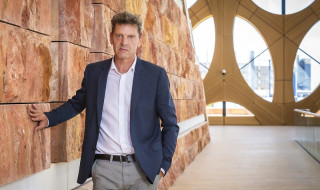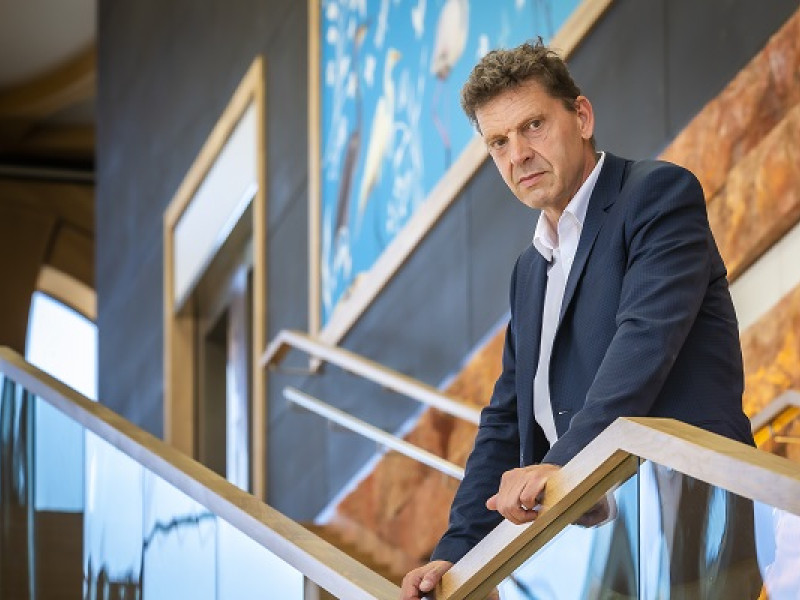"Little by little the realization is dawning that a decreasing biodiversity is bad for humanity."
“Accelerating through technology is the only way forward”
“Our planet has about twenty million species of organisms. Of these, we have named about two million over the past 400 years. This means that we do not yet know ninety percent of all species. And what you don't know, you can't protect. That's why technology is so important." A conversation with Naturalis-director Edwin van Huis.
Technology helps us analyse all life on Earth and speed up that analysis.” That is why Edwin van Huis, director of Naturalis Biodiversity Center, is pleading for large-scale investments: “To resist the rapidly deteriorating biodiversity.”
Besides being director of Naturalis and member of the Supervisory Board at SURF, Edwin van Huis is above all a biologist: “In 1972, the Club of Rome published ‘The Limits to Growth’. This report stated for the first time that, if we continue like this, it will soon be over with our planet. I was fourteen at the time and this made a huge impression. I went on to study biology in the deep conviction that we must arrange a life in which we use no more than the earth has to offer us.”
Under pressure
After positions at the Nederlands Instituut voor Beeld en Geluid and the Rijksmuseum (see insert), among others, Edwin van Huis has now been shaping his original passion and motives from Leiden for twelve years.
“Naturalis has a great responsibility to research and map the Dutch biodiversity. If you don't know ninety percent of life on earth, how can you understand what is happening in our ecosystems and how, for example, toxins and climate change affect those ecosystems? We actually have a very limited idea. In 2019, a study was released showing that in the last 50 years, 75 percent of all insects in our country have disappeared. That's hugely shocking, but perhaps the strangest thing is that everyone was surprised. No one had seen it happening. Protected animals, such as certain species of meadow birds, are closely monitored, but for insects - after all, the largest and extremely important group in the animal kingdom - this strangely did not happen. We must not let that happen again!”
“Fortunately, many people are gradually realizing that biodiversity is under enormous pressure and that this is very worrying development. In the rest of Europe this subject is high on the agenda, but in the Netherlands, we mainly talk about the climate. Little by little the realization is dawning that a decreasing biodiversity is bad for humanity. If biodiversity declines, it becomes increasingly difficult to survive. Forty percent of the earth's people depend directly on nature for their food and a much higher percentage for their income. Reason enough to protect nature. Unfortunately, from a European perspective, the Netherlands is not doing very well. Our surface water is polluted, our agricultural land is as good as dead, the North Sea is overfished, and the far too high nitrogen levels put enormous pressure on nature. There is an important role for researchers like those at Naturalis to show how biodiversity is doing and to indicate how we can turn the tide.”
Artificial intellingence
To avoid recruiting an army of biologists for every shovel of sand or every water sample taken, the application of smart technology is indispensable for Naturalis’ 140 or so full-time scientists (and about 200 visiting researchers).
“There are very few people who recognize all the plants and animals in the Netherlands and who understand how our ecosystems work. That’s why we rely more and more on genetics and IT. I already told you that we needed 400 years to describe two million species. We now have another 20 years to recognise the remaining species. It can only be done if we use technology to do the recognition of species for us.”

Edwin van Huis at Naturalis Biodiversity Centre (photo: Koen Mol)
“Indeed, artificial intelligence (AI) is increasingly being used to recognise species of plants and animals through images and sounds. You could almost say that AI has replaced biologists in this regard. Fieldwork remains important, but there are simply not enough biologists to recognise and keep track of everything. The same goes for genetics. Biologists use to go into the water with nets, today we can see what species live in the water based on genetic remains. By genetically analysing water without human intervention, we can make great strides.”
Researchers also like to enlist the help of the public, Van Huis explains. He cites the free photo-recognition app ObsIdentify as an interesting example. “This app recognizes more than 13,000 species of wild plants, animals and mushrooms from the Netherlands and Belgium. With every new species found, we expand the app further. It is the best app there is in this field, and it helps us gain insight into biodiversity.”
Large-scale investments
What does Edwin van Huis consider the biggest IT challenges for Naturalis?
“Then I come back to AI. It is difficult to find good people for that. The same goes for data architects who have to manage and control an increasingly complex infrastructure. Our digital data infrastructure is, in European terms, the most important in our field and has now acquired an independent position and importance. SURF helps with a scalable cloud environment, with data management (iRods) and high-performance computing (HPC Snellius). We are collaborating more and more with SURF.”
"Every species, every plant, every animal is part of an ecosystem and depends on cooperation."
“Accelerating through technology is the only way forward. To protect nature and halt the decline of biodiversity, we need to make a giant leap forward in the next 10 to 20 years. Without large-scale, international investment, this is impossible. It requires sharp political choices. And cooperation. This is where nature once again sets an example. Every species, every plant, every animal is part of an ecosystem and depends on cooperation. A plant cannot absorb its food without cooperating with the bacteria around its roots. Nor without fungi in the soil supplying the minerals it needs. Plants provide sugars and carbon in return. That’s how everything works together. To protect nature, make agriculture organic, improve the quality of our surface water and bring life back to the North Sea, we need to join forces. Only then can we understand, monitor, and improve biodiversity in the Netherlands. That is our challenge, but without the support of politicians and cooperation with parties like SURF we will not succeed.”
Edwin van Huis is speaker and host the SURF Summit 2023, the annual event for administrators, CSCs and other relations of the SURF cooperative, on 11 October. During this edition at Naturalis, we will use nature as a source of inspiration and hear what it has to teach us. We look both at what is there now: 'what is already blooming', and at 'where are buds that are about to bloom'; where do we together have extra water to give?
For the programme and more information: www.surf.nl/agenda/surf-summit-2023
Text: Edwin Ammerlaan
Photos: Koen Mol
About Edwin van Huis
Edwin van Huis (1958) studied biology at the University of Utrecht and the University of Florida. He studied business administration at Delft University of Technology and Erasmus University. From 1985 Van Huis worked for government organizations such as the National Service for the Preservation of Monuments, the Ministry of the Interior and the Ministry of Welfare, Public Health and Culture. In 1993 he became business director of the Rijksmuseum in Amsterdam, followed three years later by the Audiovisual Archive Center, renamed the Netherlands Institute for Sound and Vision in 2002. Since 2011, Edwin van Huis has led Naturalis Biodiversity Center in Leiden as general director. In 2018, he joined the Supervisory Board at SURF. He is also a member of the Supervisory Board at the Amsterdam School of the Arts, co-director at Japan Museum the Siebold House and board member of the International Barcode of Life.
